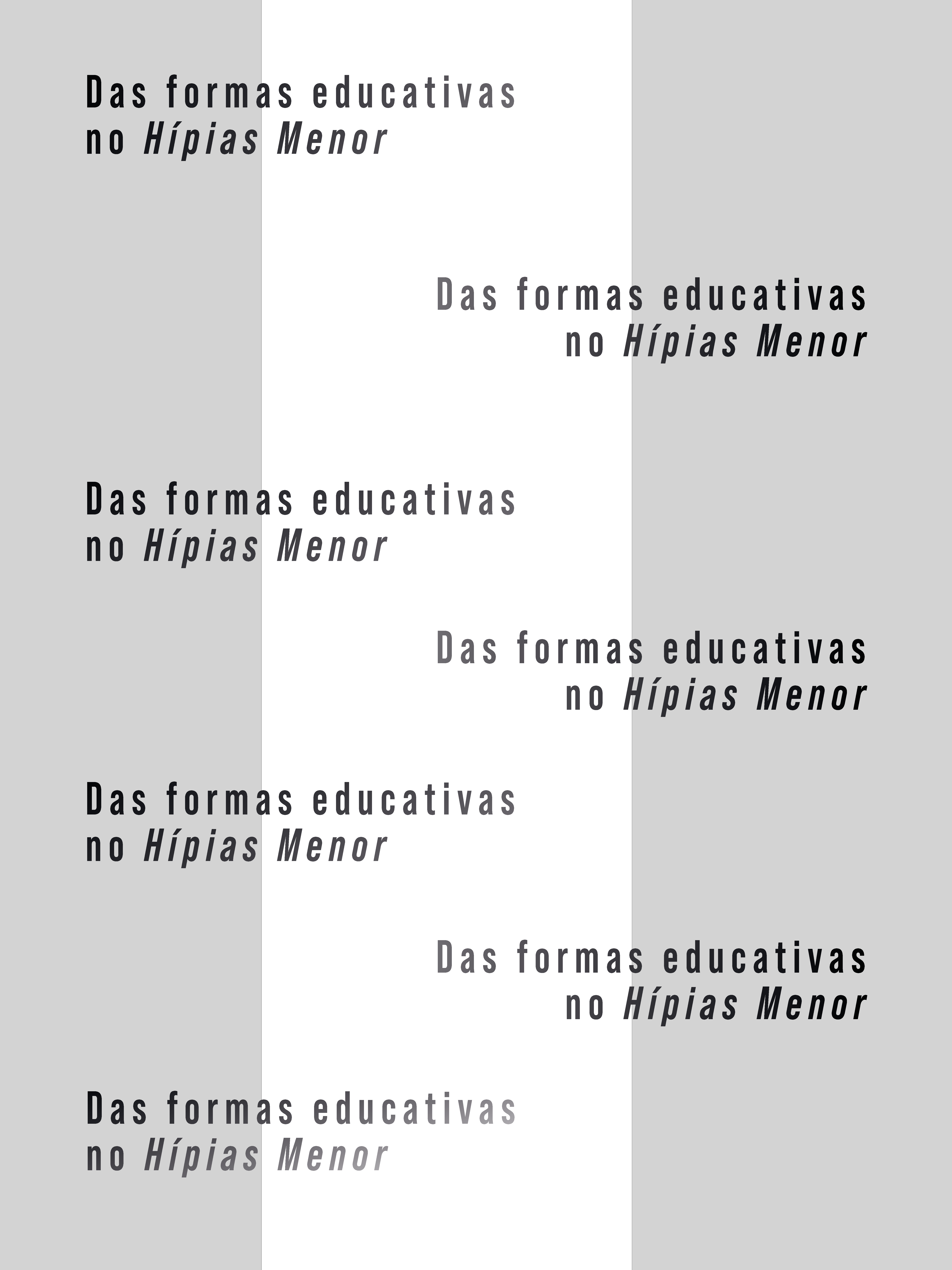On educational forms in Hippias Minor
DOI:
https://doi.org/10.11606/issn.2594-5920.primeirosescritos.2020.178953Keywords:
Plato, Hippias, Education, Poetry, ElenkhosAbstract
The purpose of this paper is to analyze the argumentative moves in Hippias Minor in order to confirm the hypothesis that the dialogue is part of a Platonic effort to place his philosophy in a classification of wisdom different from that of the culture of his time, establishing an opposition between his proposal and the moral models dictated by Homer's poetry. To do that, it is intended, on the one hand, to present the distinctions between poetry as a central form of education in the Hellenic world, with the sophist Hippias as representative of this tradition, and, on the other hand, Socrates' philosophical proposal as a way of rebutting values and conventional beliefs, and how to awake to a new model of intellectual and moral life.
References
BLUNDELL, M. W. “Character and Meaning in Plato’s Hippias Minor.” In Methods of Interpreting Plato and his Dialogues. Edited by J. C. Clagge and N. D. Smith. Oxford. 1992. pp. 131–72.
CHANTRAINE, P. Dictionnaire étymologique de la langue grecquehistoire des mots. Paris: Klincksieck, 1999.
GOLDSCHMIDT, V. Os diálogos de Platão. Estrutura e método dialético; tradução Dion Davi Macedo. São Paulo: Edições Loyola, 2002.
GORDON, J. Turning Toward Philosophy. Literary Device and Dramatic Structure in Plato’s Dialogues. The Pennsylvania State University, 1999.
HAVELOCK, E. Prefácio a Platão; Tradução: Enid Abreu Dobránzsky. Campinas, São Paulo: Papirus, 1996.
HOMERO. Ilíada; tradução e prefácio de Frederico Lourenço; introdução e apêndices de Peter Jones; introdução à edição de 1950 E. V. Rieu. São Paulo: Penguin Classics Companhia das Letras, 2013.
HOMERO. Ilíada. Odisseia; tradução e prefácio de Frederico Lourenço; introdução e notas de Bernard Knox; São Paulo: Penguin Classics Companhia das Letras, 2011.
KAHN, C. Plato and the Socratic Dialogue. Cambridge University Press: Cambridge, UK. 1996.
LIDDELL, H. G. et al. LSJ, A Greek English Lexicon. 9ª ed. revisada. Oxford: Clarendon Press, 1819.
NIGHTINGALE, A.W. Genres in Dialogue: Plato and the Construct of Philosophy. Cambridge: Cambridge University Press (Virtual Publishing), 2001.
PLATÃO. A República: (ou sobre a justiça, diálogo político); tradução Ana Lia Amaral de Almeida Prado; revisão técnica e introdução Roberto Bolzani Filho. – 2. ed. – São Paulo: Martins Fontes – selo Martins, 2014.
PLATÃO. Apologia de Sócrates precedido de Êutifron (Sobre a piedade) e seguido de Críton (Sobre o dever) / Platão; introdução, tradução do grego e notas de André Malta. Porto Alegre, RS: L&PM, 2016.
PLATÃO. Hípias Maior Hípias Menor / Platão; tradução Carlos Alberto Nunes; editor convidado Plínio Martins Filho; organização Benedito Nunes & Victor Sales Pinheiro; texto grego John Burnet. – Ed. Bilíngue. – Belém: ed.ufpa, 2016.
PLATÃO. Teeteto-Crátilo; Tradução de Carlos Alberto Nunes. Belém: Universidade Federal do Pará, 1988.
UNTERSTEINET, M. A obra dos sofistas – uma interpretação filosófica; tradução Renato Ambrósio. São Paulo: Paulus, 2012.
VLASTOS, G. “The Socratic Elenchus: method is all”, in: M. BURNYEAT (ed.), Socratic Studies. Cambridge: Cambridge University Press, 1994. pp. 1-37.

Downloads
Published
Issue
Section
License
Copyright (c) 2021 Universidade de São Paulo. Faculdade de Filosofia, Letras e Ciências Humanas

This work is licensed under a Creative Commons Attribution 3.0 Unported License.
Proposta de Política para Periódicos de Acesso Livre
Autores que publicam nesta revista concordam com os seguintes termos:
- Autores mantém os direitos autorais e concedem à revista o direito de primeira publicação, com o trabalho simultaneamente licenciado sob a Licença Creative Commons Attribution que permite o compartilhamento do trabalho com reconhecimento da autoria e publicação inicial nesta revista.
How to Cite
Funding data
-
Conselho Nacional de Desenvolvimento Científico e Tecnológico
Grant numbers 136379/2020-6


